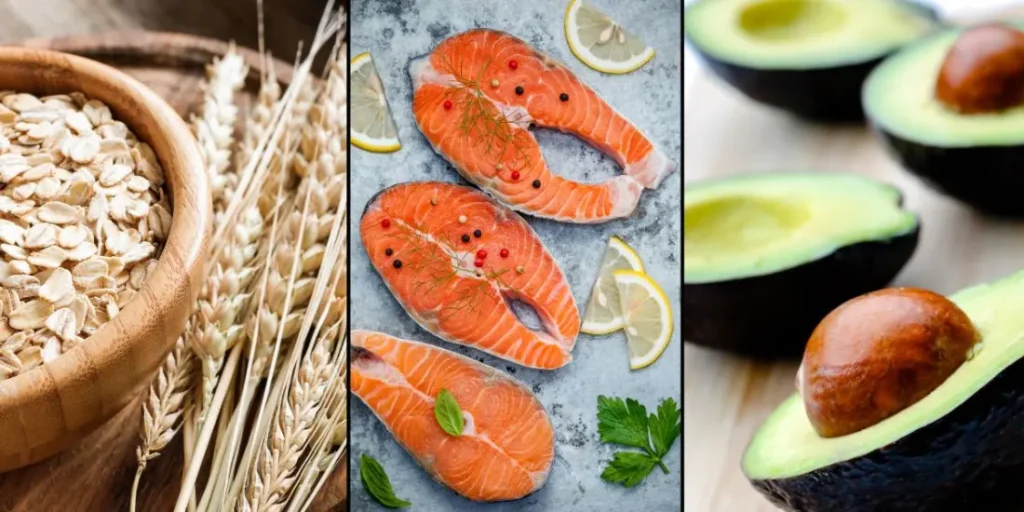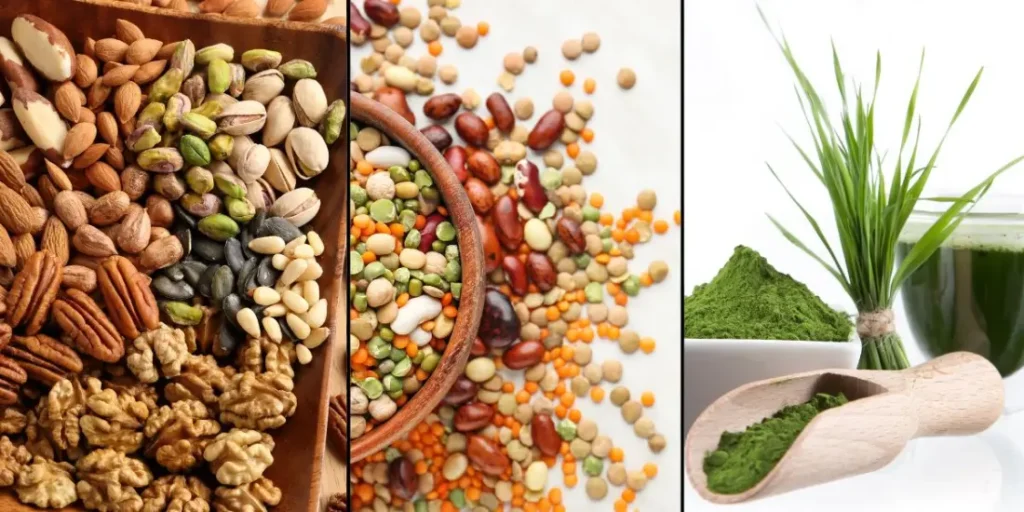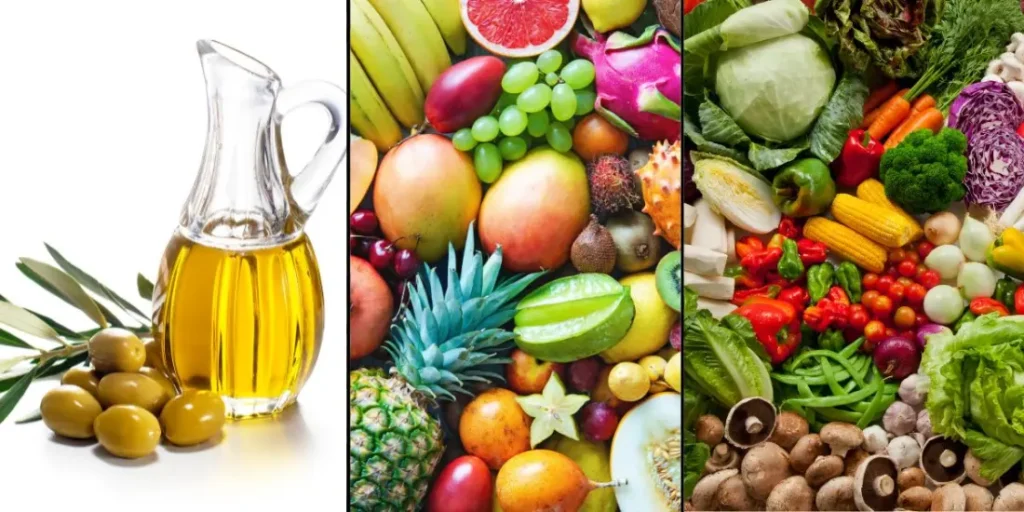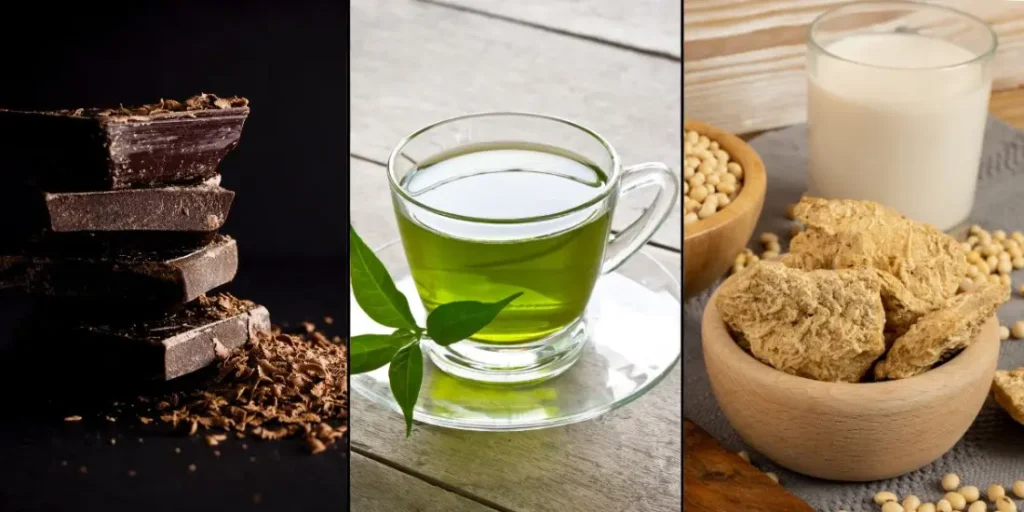It’s not only about eliminating the bad foods — managing cholesterol is also about incorporating the right foods that can actually make your heart healthier. What you eat daily has a direct correlation with your cholesterol levels and health. The best news? Nature is packed with a lot of strong ingredients that can assist in reducing LDL (bad) cholesterol and increasing HDL (good) cholesterol. Let’s see the top Cholesterol-Lowering Foods that not only help towards a healthier heart but also taste great.
12 Cholesterol-Lowering Foods:
1. Oats – A Strong Morning Start
Your breakfast can be a lifesaver for your heart, and oats are the winner in that department. This whole grain is loaded with soluble fiber that lowers LDL or “bad” cholesterol. Oats also keep you full longer, reducing your overall calorie intake. Adding it to your daily routine is a simple yet powerful step.
- Loaded with beta-glucan fiber
This special fiber binds to cholesterol and removes it from your body. It forms a gel-like substance in your intestine that traps cholesterol before it is absorbed.
- Makes you feel fuller for longer
It controls blood sugar and reduces snacking on unhealthy foods. This leads to better appetite control and reduced saturated fat consumption.
- Easy to prepare
You can take oats as overnight oats, porridge, or even smoothies. They are so versatile that they are an easy addition to your life.
2. Fatty Fish – Heart-Friendly Omega-3s: Cholesterol-Lowering Foods
Fish such as salmon, mackerel, and tuna are packed with omega-3 fatty acids that are favorable to your heart. They lower triglycerides, decrease LDL cholesterol, and increase HDL (good cholesterol). Omega-3s also decrease inflammation, one of the underlying causes of heart problems.
- Great source of Omega-3
These fatty acids enhance lipid profiles and guard blood vessels. They may also prevent plaque formation in arteries.
- Maintains heart rhythm and function
Daily consumption of fish maintains regular heartbeat and blood pressure. It lowers the risk of arrhythmias and heart attacks.
- Grilled or baked is best
Frying cancels out health benefits. Breading and frying should be avoided.

3. Avocados – Creamy Package of Healthy Fat
Avocados provide creamy texture along with high health benefits. They’re rich in monounsaturated fats that decrease LDL cholesterol levels while maintaining HDL levels. They also offer dietary fiber, which aids in digestion and in controlling cholesterol levels.
- Rich in monounsaturated fat
Can decrease bad cholesterol without touching the good stuff. These fats could also decrease stomach fat, further aiding in overall cardiovascular health.
- Has soluble fiber
Helps to flush cholesterol out of the system. It also maintains stable blood sugar and healthy digestion.
- Use as a butter substitute
Spread on toast or mix into smoothies in place of mayo or butter. It’s a healthy and tasty substitute.
4. Nuts – Little in Size, Large in Benefits: Cholesterol-Lowering Foods
Almonds, walnuts, pistachios, and other nuts are little packets of heart-healthy nutrients. They contain unsaturated fats, fiber, and natural plant sterols. Eating a handful of unsalted nuts daily can have a great impact on your cholesterol levels.
- Filled with good fats
Nuts’ unsaturated fats reduce LDL and enhance HDL. The fats are critical to the health of cells and hormone balance.
- Have plant sterols
These compounds block cholesterol absorption in the gut. They mimic cholesterol and compete for absorption.
- Smart snacking choice
A great alternative to processed snacks like chips or cookies. They provide protein, energy, and long-lasting satiety.
5. Legumes – Plant-Based Protein for the Win:Cholesterol-Lowering Foods
Beans, lentils, chickpeas, and peas are excellent sources of fiber and plant protein. They help lower LDL levels naturally and also support weight control. Adding them to your meals provides both taste and heart benefits.
- Packed with soluble fiber
Fiber binds cholesterol and eliminates it through digestion. It supports a healthy gut and reduces inflammation.
- A healthy substitute for meat
Less fat and more fiber makes legumes heart-friendly. They’re affordable and earth-friendly, too.
- Blood sugar-friendly
Also helps regulate blood sugar levels, which is part of overall heart health. Stable blood sugar maintains stable energy and curbs cravings.

6. Barley – An Ancient Grain with Modern Power:Cholesterol-Lowering Foods
Much overlooked, barley is an amazing grain with powerful cholesterol-lowering activity. It’s particularly high in beta-glucan fiber which enhances digestion and lowers bad cholesterol. Getting this grain back into your diet is a good decision.
- High in cholesterol-fighting fiber
Beta-glucan actively reduces levels of LDL. It stabilizes blood sugar and encourages satiety.
- Aids gut health
Serves as a prebiotic to nourish good gut bacteria. A healthy gut microbiome is directly linked to heart health.
- May be used to substitute rice in meals
Utilize in soups, stews, or as a base grain for a healthy kick. It’s filling, rich, and low in fat.
7. Olive Oil – Liquid Gold for the Heart:Cholesterol-Lowering Foods
Olive oil is a mainstay of the Mediterranean diet and for good reason. It’s rich in monounsaturated fats and antioxidants that help keep the heart healthy. It’s used best in dressings for salads, as a finishing oil over food, or for delicate sautéing.
- Healthy fat winner
Lowers LDL cholesterol and protects HDL levels. Also lessens inflammation and oxidative stress.
- Antioxidant powerhouse
Is filled with polyphenols that decrease inflammation and damage to arteries. These antioxidants have been associated with reduced risk of heart disease.
- Swap for butter or refined oils
Best used raw or lightly cooked to retain nutrients. Avoid high heat to keep its heart-protective properties intact.
8. Fruits – Sweetness with a Purpose:Cholesterol-Lowering Foods
Fruits such as apples, oranges, grapes, and berries are not only deliciously sweet but also excellent at keeping cholesterol in check. Their fiber, antioxidants, and phytochemicals combine to combat LDL oxidation and enhance heart function.
- Pectin fiber reduces LDL
Soluble fiber traps cholesterol and eliminates it. Pectin is particularly abundant in apples and citrus fruits.
- Loaded with antioxidants
Flavonoids shield arteries from damage and suppress inflammation. Berries are especially full of heart-protective nutrients.
- Healthy dessert substitute
Replace cakes with a fruit bowl to curb cravings naturally. Fruit natural sugars are less detrimental than added sugars.

9. Vegetables – The Colorful Shield for Your Heart:Cholesterol-Lowering Foods
All vegetables—particularly leafy greens, carrots, broccoli, and eggplant—have several heart benefits. They are high in fiber, vitamins, and antioxidants, which make them essential for cholesterol management and overall well-being.
- Low-calorie, high-fiber
Aid in weight loss and lower cholesterol naturally. The fiber helps with digestive health and cholesterol elimination.
- Natural anti-inflammatory agents
Antioxidants guard the heart and minimize damage from LDL. Cruciferous vegetables contain additional cancer-fighting compounds.
- Can be steamed or consumed raw
Flexible in dishes—steam, sauté, or puree into smoothies. Add color to your plate for a range of nutrients.
10. Dark Chocolate – A Healthy Treat in Moderation:Cholesterol-Lowering Foods
Dark chocolate, particularly those with high cocoa content, can be heart-friendly in moderation. It has flavonoids that enhance circulation and reduce LDL oxidation. Just make sure you choose varieties low in sugar and high in cocoa.
- Rich in antioxidants
Flavonoids defend your heart and enhance cholesterol equilibrium. They also decrease blood pressure and stress hormones.
- Boosts good cholesterol
Small quantities might help elevate HDL levels. Research demonstrates enhanced blood flow and decreased inflammation.
- Go for 70% cocoa or higher
The greater the cocoa, the healthier the benefits. Steer clear of milk chocolates with sugar and fat added.
11. Green Tea – Drink Your Way to Lower Cholesterol:Cholesterol-Lowering Foods
Green tea is more than a relaxing beverage—it’s a heart ally. It’s packed with catechins, antioxidants that are proven to lower LDL and aid in fat metabolism. Consume 1–2 cups per day to support your heart and waistline.
- Catechins inhibit cholesterol absorption
Aids in regulation of how much fat is absorbed into your blood. It also inhibits oxidative damage to the blood vessels.
- Boosts metabolism
Aids in weight loss, which also aids in cholesterol control. Green tea may assist in fat burning when taken before exercise.
- Excellent caffeine substitute
Hydrates and heals without fat or sugar. It’s a cleaner energy source than sugary coffee beverages.

12. Soy Foods – Power-Packed Plant Protein:Cholesterol-Lowering Foods
Soy foods such as tofu, soy milk, and edamame are rich in protein and cholesterol-lowering substances. They’re an excellent meat substitute and contain isoflavones that aid in heart health.
- Reduces LDL cholesterol levels
As little as 25g of soy protein a day can be effective. It’s heart-healthy, with FDA recognition.
- High in isoflavones
These natural plant substances enhance heart function and lower risk. They also exhibit weak antioxidant and anti-inflammatory action.
- Simple to add to any meal
Include tofu in stir-fries or soy milk in smoothies and cereals. These foods are convenient and satiating.
Conclusion:
Decreasing cholesterol doesn’t need drastic action—it begins with small, deliberate decisions at each meal. By making heart-healthy foods such as oats, fatty fish, nuts, and green leafy vegetables a part of your regular regimen, you’re actively nourishing your cardiovascular system. These foods naturally work to decrease LDL cholesterol, boost HDL, and combat inflammation from the inside out.
A heart-healthy lifestyle is long-term, not short-term. Combining these eating habits with regular exercise, stress reduction, and adequate fluid intake is an unbeatable prescription for long-lasting health. Take the first step today by simply adding even a single one of these foods to your plate, and make mealtime the launchpad for an even stronger, healthier heart.
FAQs:Frequently Asked Questions
Top cholesterol-lowering foods are oats, fatty fish, nuts, legumes, fruits, vegetables, and olive oil. All of these contain fiber, good fats, and antioxidants that assist in lowering LDL (bad) cholesterol and aid heart health.
With regular diet changes and healthy living habits, you can begin noticing the changes in your cholesterol levels within 4 to 6 weeks. But it always depends on genetics, general health, and how rigorous you are about the changes.
Yes, people can naturally reduce cholesterol by diet, exercise, weight loss, and reduction of stress. Always check with your doctor to find out if medication is needed in addition to changing your ways.
No—good fats in avocados, nuts, seeds, and olive oil actually lower LDL (bad) cholesterol and raise HDL (good) cholesterol. It’s trans fats and too much saturated fats that need to be restricted.







